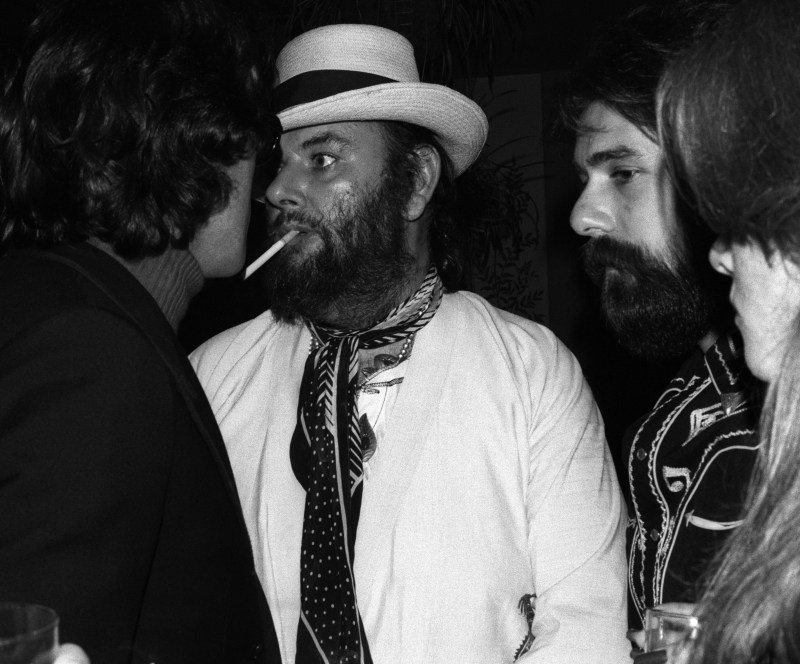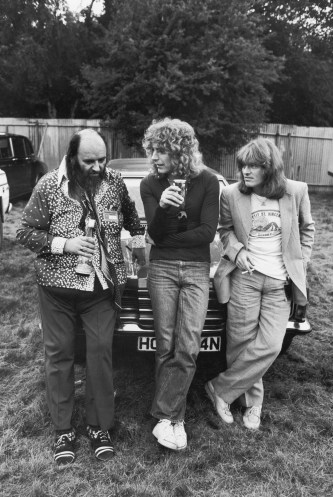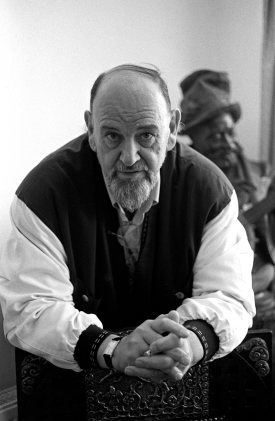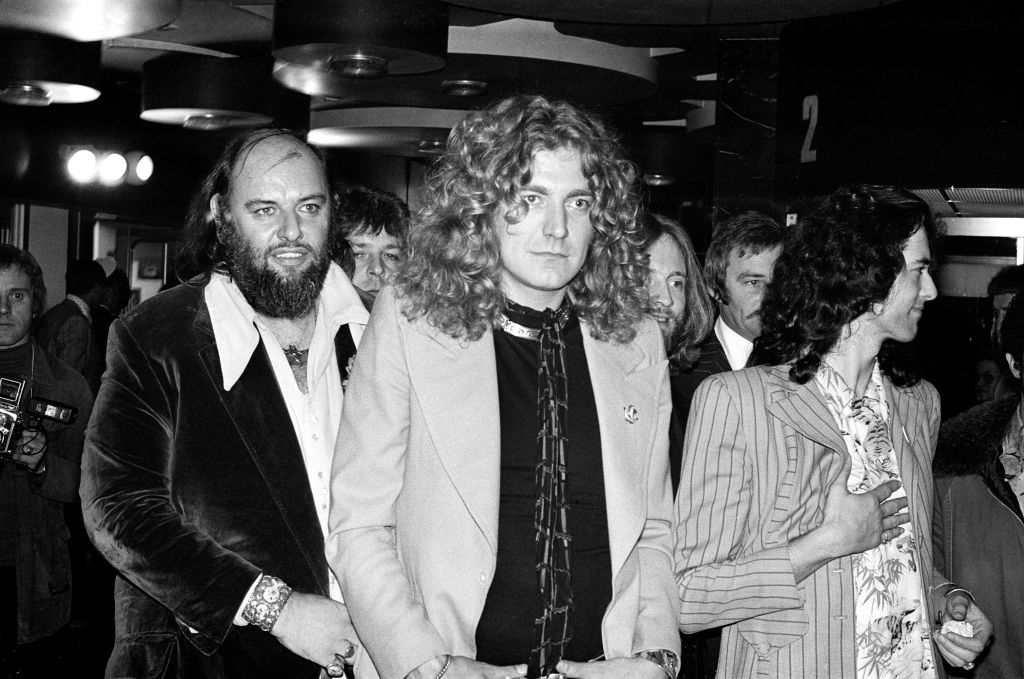Ozzy Osbourne had his bat, Pink Floyd had their pig, and Led Zeppelin, at least according to legend, had their mud shark.
Introduced to the masses in the 1985 Led Zeppelin biography Hammer of the Gods, the legend of the mud shark holds that the band was staying at the Edgewater Inn atop Seattle’s Puget Sound. One of the perks of staying there was that guests had the option to fish off their balconies into the water below. After taking advantage of this, and hooking a shark, the band as well as road manager Richard Cole and members of the group Vanilla Fudge, enlisted a particularly daring groupie.
“A pretty young groupie with red hair was disrobed and tied to the bed,” Stephen Davis wrote in Hammer of the Gods. “Led Zeppelin then proceeded to stuff pieces of shark into her vagina and rectum.”
While some have called that description of the incident a bit fishy, the author of a new book on legendary Zeppelin manager Peter Grant, Bring It On Home: Peter Grant, Led Zeppelin, and Beyond–The Story of Rock’s Greatest Manager, Mark Blake, told RealClearLife the account is generally true.

“It did happen,” Blake told RCL. “Richard Cole told me it happened and he was the guy that held the shark. He was there along with a couple of members of Vanilla Fudge. The groupie’s name was Jackie. I think they were just fooling around … the fish wasn’t inside her for that long. It was dead. Robert Plant also told me saw it. I don’t think Peter Grant did but obviously, everyone heard about it.”
As shocking as a story like that might be, it’s exactly the kind of tale Blake had to look into and conduct interviews about while researching Grant, who is often acknowledged as the “fifth member of Led Zeppelin.”
To paint a picture of Grant, it was important for Blake to “cut through all the mythology” and see if the stories going around the industry were true or false. “Some of those stories just aren’t true or are partially true,” Blake said. “The reality was usually far worse though. The truth is as bad as the fiction – or worse.”
Just consider this uncensored tale.
“One of the things I got hold of was Peter in a hotel room talking about his life for a proposed film,” Blake said. “It never got made but it was ongoing for years. He was talking about the groupies and he said that when the band booked hotel suites, they would book more than they needed as a way of avoiding people who were looking for them. They had dummy rooms. They weren’t all in the same suites or on the same floor. Peter said he was checking out one of the rooms once and he walked in and could hear a noise coming from the bedroom.”
Grant opened the door to check it out and, lo and behold, there was a naked woman chained to the bed by her ankles and her wrists.

Blake continued: “He said, ‘What are you doing here?” She said, ‘I don’t know, but guys keep coming in and f–king me.’ He said, ‘Ok, are you alright and she said ‘Oh yeah, I’m fine.’ He told her to have a nice day and walked out. That kind of sums up the attitude at that time and some of what was taking place on the road. Clearly, she was having sex with members of the band or the crew or whomever while chained up. And that was considered normal at that time in that world. It wouldn’t be now for all sorts of reasons.”
A former bit-part actor, wrestler, cab driver, and nightclub bouncer, Grant was, at least at that time, a man who could regard a situation like that as normal. As with the shark tale, it’s not something that would fly these days.
“It’s impossible to imagine them as a band starting out right now,” Blake said. “Right place, right time. I think they belonged in a certain place and it was the late 1960s. That was where they belonged. It’s just four blokes who happened to get together and get lucky and have some chemistry and create this amazing music. It’s still just four ordinary guys offstage. No matter how many women and drugs and money they get, it’s just ordinary people who have extraordinary lives. I think that was the case with Peter. He was an ordinary man who led an extraordinary life.”
To help shed some light on what gave Grant his legendary status and made him so instrumental to Zeppelin’s success, Blake answered a few more questions.

What set Grant apart from other rock managers during the ‘60s and ‘70s?
“He was aggressive but he was also very forward-thinking. His maxim towards Led Zeppelin was always about putting the band first which was an unusual policy to have at that time because a lot of managers believed that the artist worked for them. A lot of bands in U.S. and UK didn’t make a lot of money; their manager did. Peter worked on the idea that if you looked after the artist, the music would follow and everyone would be very creative and sells lots of tickets and records and they’d all make money. That turned out to be the right thing.
Did he have a specific style?
“His management style was very hands-on. He traveled with his band and went on tour with them which was unusual for a manager. And anything related to the band had to go through Peter first. He built a wall around them and you had to get through him to get to Led Zeppelin. He was a hustler from South London. He talked his way into the music business. He had a lot of what we call ‘front.’ He had a lot of charm, a lot of cheek, he was aggressive. People were scared of him and he made a lot of money for himself and his band with that combination. But there’s a huge amount of luck involved.”
How did Grant manage the egos of the different members of the group?
“You had four people in Led Zeppelin, very different characters, two of whom were far more experienced in touring and recording than the other two. I think that required some delicate handling over the years. Robert Plant and John Bonham were not as experienced as Jimmy Page and John Paul Jones and it certainly took some of Peter’s negotiating skills to mediate between them all.”

How did he deal with Plant and Page specifically?
“They’re both very different people. What it took at that time was to let them go away and be creative and get on with what they wanted to do. Led Zeppelin was Jimmy Page’s band. It was his idea and he put it together and brought the others in. The first person that came in was Peter and then they got the others. As time went on Robert Plant became more of a focal point within the group as the lead singer does and started writing more songs. Peter also had to deal with negotiating and handling him delicately as well. I suspect the other two understood and somewhat knew their role in the band. There was a power struggle between Page and Plant. Peter had to keep both of them happy and the other two as well.”
What was Grant’s greatest asset as a manager?
“He always ensured the band got paid. That in and of itself was quite a rarity. At that point in time, it was a cash business. You’d be given a bag of cash and if the promoter asked for money back at the end of the night because of low attendance, bands, in the past, had accepted it. In Peter Grant’s case, he insisted on being paid in full and he always got the money because he was 6’ 3” and at his worst weighed around 300 pounds. You weren’t going to argue with him. It was almost industry standard to scam the bands and he changed that. He made sure the band got paid and later on did lots of work negotiating with ticketing agencies. It was unheard of at the time.”
What was Grant’s crowning achievement while running Led Zeppelin?

“Getting them to make as much money as they did and getting them paid. Helping them to main a mystique. He was very good at keeping them away from the media. The whole thing of not appearing on television and not releasing singles was absolutely unheard of then. It was a very daring position to take. I think by doing it, he was able to maintain this aura around the band and that’s why they sold so many concert tickets and full-length records. There was no other way to see or hear them. He changed the way the music business is. The legacy of what he achieved continues now.”
Were you surprised by anything while researching the book?
“I didn’t realize the extent of the greed and the backstabbing that went on towards the end of Led Zeppelin. I was surprised by how greedy some people became. There was so much money going through that band. When Bonham died the band said they weren’t going to continue but there was enormous pressure from other people, not Peter, and the record company for them to go on. People didn’t want their cash cow to end.”
What was life after Zeppelin like for Grant?
“He was a very proud grandfather when he died. After all that madness on the road with Led Zeppelin, he lived the last few years of his life very peacefully and very quietly. He looked after his grandkids because he was good at babysitting. That was his life. He couldn’t be further removed from how it was in the Zeppelin days. He died young [at 60] but he wasn’t trying to relive the life he’d had earlier. He knew it was time to move and he did. There was something quite dignified in that. He wasn’t the ogre he portrayed himself as.”
This article appeared in an InsideHook newsletter. Sign up for free to get more on travel, wellness, style, drinking, and culture.

























